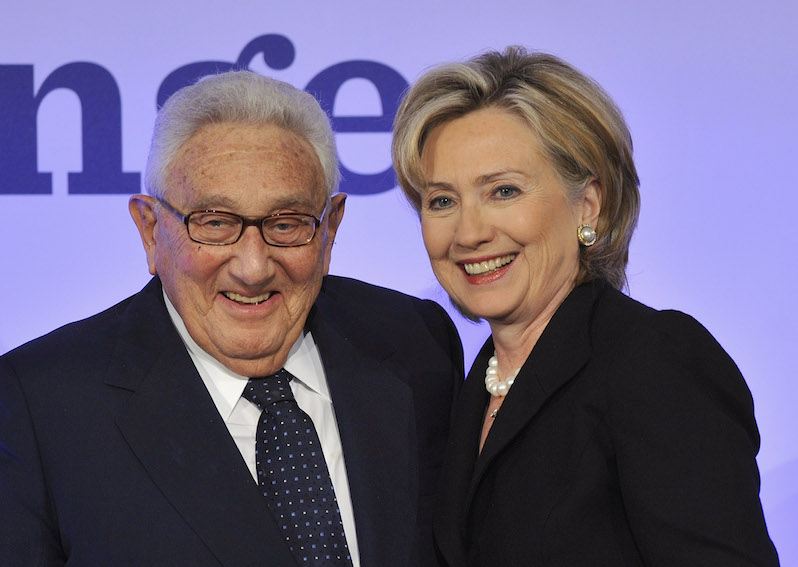Can Hillary Clinton Renounce Henry Kissinger?
As Californians prepare for a historic opportunity to choose the Democratic presidential candidate, here’s some background on why Clinton’s admiration for Kissinger should give them pause. Former Secretary of State Henry Kissinger is one of Clinton's mentors. (Gero Breloer / AP)
1
2
3
Former Secretary of State Henry Kissinger is one of Clinton's mentors. (Gero Breloer / AP)
1
2
3
Hillary’s Quandary
The critical question at this juncture is what this portends for Hillary Clinton’s foreign policy.
Kissinger is mentor and confidante to our presumptive Democratic nominee for president, whose own foreign policy—particularly her liking for regime change—mirrors Kissinger’s more than would be expected of someone claiming the mantle of “progressivism.”
Clinton referenced “differences” with Kissinger in her review of “World Order,” and, on the debate stage, performed a lukewarm distancing from a perpetrator of so many prosecutable crimes.
There is still time for our presumptive nominee to set her administration of foreign policy apart from the pack—or for the public to demand it with a resounding peace vote for Bernie Sanders in the remaining primaries. The alternative is perpetuation of the “liberal international world order” as writ most eloquently by Kissinger and perpetuated in Clinton’s own practice, most openly in regime change in Libya and her heretofore ignored support for the coup in Honduras.
If she declines to pursue a new foreign policy paradigm, Clinton, while not stooping like Trump to the demonization of nearly 25 percent of the world’s population, shows little promise of advancing the “progress” she claims to embrace.
Documenting the charges
Documentation of Kissinger’s devilment in the name of democracy is abundant. A good starting place for the uninitiated is Seymour Hersh’s landmark exposé, “The Price of Power, Kissinger in the Nixon White House.” William Shawcross’ “Sideshow: Kissinger, Nixon and the Destruction of Cambodia” chronicles the Cambodia tale. There is Christopher Hitchens’ “The Trial of Henry Kissinger.” Greg Grandin’s “Kissinger’s Shadow” and his many articles offer a contemporary look at Kissinger’s impact. Only have time for a short read? Look for Anthony Lewis’ review of “The Price of Power” in The New York Times (June 26, 1983) for a prescient view of where we stand today. The works on Sheehan’s 1971 bibliography remain vital resources on the conduct of the war to that date. Nick Turse’s “Kill Anything That Moves” covers the devastating scope of U.S. war crimes and crimes against humanity in Vietnam.
Barbara Myers is an independent journalist. She has written pieces covering Vietnam (the life of Anthony J. Russo), China (The Agnes Smedley Film Project) and Rwanda, where she is a mentor to college-bound youth. Myers first documented the work of Henry Kissinger in 1972, as communication manager for the L.A. chapter of the Indochina Peace Campaign.
Your support matters…
SUPPORT TRUTHDIG
Independent journalism is under threat and overshadowed by heavily funded mainstream media.
You can help level the playing field. Become a member.
Your tax-deductible contribution keeps us digging beneath the headlines to give you thought-provoking, investigative reporting and analysis that unearths what's really happening- without compromise.
Give today to support our courageous, independent journalists.






You need to be a supporter to comment.
There are currently no responses to this article.
Be the first to respond.